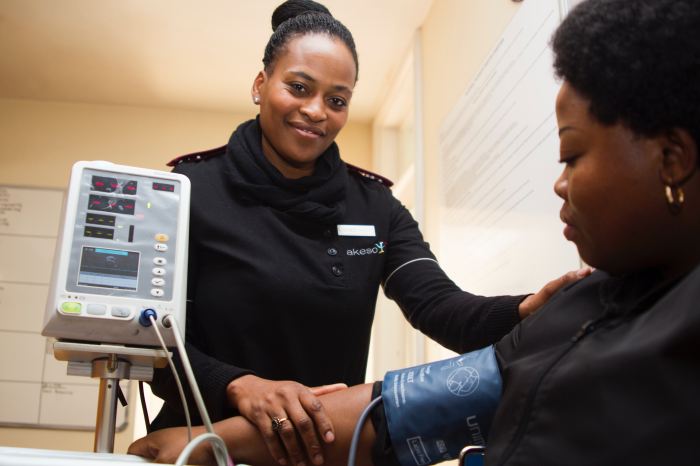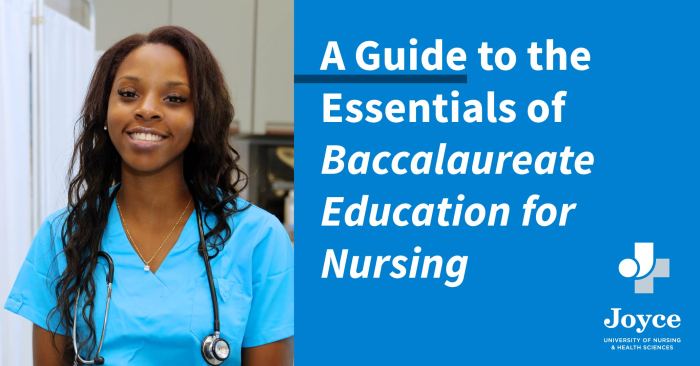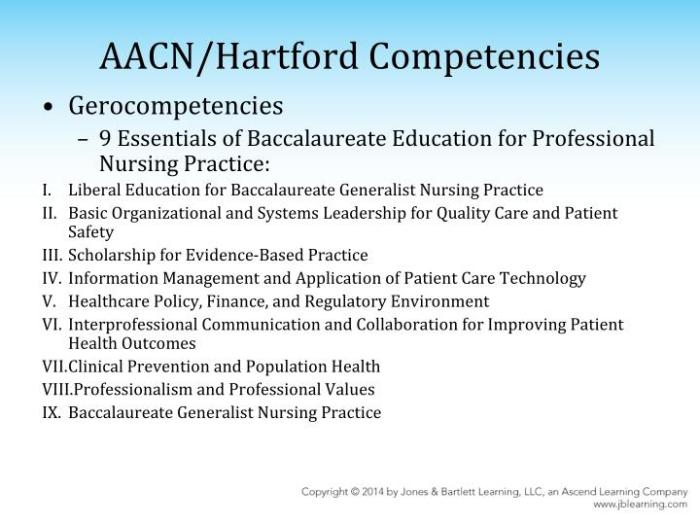Essentials of baccalaureate education for professional nursing practice stand as the cornerstone of preparing nurses to deliver exceptional patient care. This comprehensive education equips nurses with the knowledge, skills, and values necessary to navigate the complexities of healthcare and make a meaningful impact on patient outcomes.
As we delve into this topic, we will explore the historical and philosophical underpinnings of baccalaureate nursing education, core competencies for professional nursing practice, curriculum design and delivery, clinical experiences and interprofessional collaboration, assessment and evaluation, faculty development and support, research and evidence-based practice, leadership and advocacy, ethical and legal considerations, and baccalaureate nursing education in a global context.
Baccalaureate nursing education is a transformative journey that empowers nurses to provide holistic care, promote health and wellness, and advocate for their patients. It fosters critical thinking, problem-solving, and decision-making skills, enabling nurses to adapt to evolving healthcare landscapes and deliver evidence-based care.
1. Foundations of Baccalaureate Nursing Education

Baccalaureate nursing education has a rich history and philosophical foundation. Its origins can be traced back to the late 19th century when nursing leaders recognized the need for a more rigorous and comprehensive education for nurses.
The essential concepts and principles that guide baccalaureate nursing programs include a focus on the whole person, the importance of evidence-based practice, and the need for nurses to be critical thinkers and problem solvers.
Structure and Organization of Baccalaureate Nursing Curricula, Essentials of baccalaureate education for professional nursing practice
Baccalaureate nursing curricula are typically four years in length and include a combination of classroom instruction, laboratory experiences, and clinical rotations. The curriculum is designed to provide students with a strong foundation in the sciences, nursing theory, and clinical practice.
2. Core Competencies for Professional Nursing Practice: Essentials Of Baccalaureate Education For Professional Nursing Practice

Baccalaureate nursing graduates must possess a range of core competencies to provide safe and effective patient care. These competencies include:
- Cognitive skills: Critical thinking, problem-solving, and decision-making
- Affective skills: Empathy, compassion, and communication
- Psychomotor skills: Physical assessment, medication administration, and wound care
Nurses must also be able to work effectively in a team environment and collaborate with other healthcare professionals.
3. Curriculum Design and Delivery
Baccalaureate nursing curricula are designed using principles of adult learning and cognitive psychology. Teaching and learning methods include:
- Lectures
- Seminars
- Simulation labs
- Clinical rotations
Technology is increasingly being used in nursing education to enhance student learning and engagement.
4. Clinical Experiences and Interprofessional Collaboration
Clinical experiences are an essential component of baccalaureate nursing education. They provide students with the opportunity to apply their knowledge and skills in a real-world setting.
Interprofessional collaboration is also important in nursing practice. Nurses must be able to work effectively with other healthcare professionals to provide comprehensive patient care.
5. Assessment and Evaluation

Assessment and evaluation are essential components of baccalaureate nursing education. They provide students with feedback on their progress and help faculty to improve the curriculum.
Assessment methods include:
- Exams
- Quizzes
- Clinical evaluations
- Portfolio assessments
Standardized testing is also used to measure student learning and program outcomes.
Expert Answers
What are the core competencies for professional nursing practice?
Core competencies for professional nursing practice include patient care, communication, collaboration, critical thinking, problem-solving, decision-making, and leadership.
How does baccalaureate nursing education prepare nurses for interprofessional collaboration?
Baccalaureate nursing education integrates interprofessional experiences into the curriculum, fostering collaboration with other healthcare professionals to deliver comprehensive patient care.
What is the role of research in baccalaureate nursing education?
Research in baccalaureate nursing education promotes evidence-based practice, enabling nurses to stay abreast of the latest advancements and deliver care informed by the best available evidence.